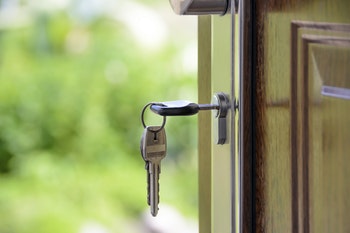Every person looks upon their home as their castle. It’s where they live with their families, and it’s generally where you store your most precious possessions. It’s only natural that you will do whatever it takes to protect and defend what is yours, and that, of course, means protecting them from harm in the most effective way possible. Hundreds of years ago you could, if you had the wherewithal, have built a moat and ramparts around your ‘castle’. Nowadays, that option, though still very tempting, isn’t really an option.
So what can you do to safeguard your family and possessions? How do you protect what’s yours, and stop intruders taking the property you’ve worked so hard for? Well, one option that any homeowner should seriously consider is installing high-security door locks. They’re strong, robust, generally manufactured to the highest possible standards, and reassuringly expensive. Yet the question still remains is, are high-security locks all they’re cracked up to be, and do you get what you pay for?
What is a high-security lock, and are you really getting what you pay for?
A high-security lock claims to have a number of advantages over cheaper locks. They’re manufactured with cylinders which claim to be much harder to pick, and are made from specialised materials, like hardened steel, stainless steel or boron steel which claim to offer the best resistance against forced entry and bumping. Moreover, high-security locks also have advanced key-control: this is usually accomplished by the manufacturer designing and patenting a keyway that is unique. This ‘utility patent’ describes how the key and keyway function together, and also describes how the key activates the pins or discs in the keyway mechanism. The use of a utility patent is how manufacturers and their distributors control the keys. What that means is that locksmiths and key-cutting shops shouldn’t be able to copy a patented key. The only way homeowners can obtain another key is by contacting the manufacturer or authorised representative directly.
Reassurance comes at a price
If you’re getting a bespoke product, then naturally you would expect to pay more for it. However, in some instances, ‘more’ can actually mean spending up to 10 times the amount you would normally pay for a standard door lock. The price may well put a lot of people off, and force their hand into buying a cheaper alternative; but it’s worth looking at the broader picture before making your final decision. Yes, high-security locks can be expensive, but properties fitted with high-security locks tend to be cheaper to insure, as insurers are prepared to offer discounts to properties with high-end security protection. At the end of the day, the final decision lies with the homeowner. Do you skimp on costs and install inferior locks; or do you pay a top-end price for security, but recoup some of that extra expense with reduced insurance premiums?
What are the key characteristics of high-security locks, and how can you tell if you’re buying a quality product?
Although there are many products on the market which claim to be high-security door locks, it’s important to remember that not all of them are what they claim to be, nor are they necessarily as secure as they make out. So, how can you tell which are good locks, and which are inferior? What features would you expect to find in high-end security locks?
Checklist: the things you need to look out for
- High measure of key control
- Patented key, keyway and/or lock mechanism
- Construction from high quality materials
- Pick resistance
- Resistance to drilling, prying and hammer attacks
- Resistance to lock snapping
You do not need a lock that has everything listed above, but the more qualities and attributes they have, the better security resilience they are going to offer. The checklist can also be a useful yardstick when it comes to evaluating whether some of lower priced high-security locks offered by mid-tier manufactures come up to scratch. You may also want to carry out some further research on high-security locks before making your purchase: so here are a few other points that are worth exploring:
Lock cylinder complexity
The more complex the door lock cylinder: the more difficult it should be to pick or bump. All locks are capable of being picked at the end of the day, if the potential burglar is determined and skilled enough to do it. However, what is true is that more complex security lock cylinders will definitely act as a deterrent to casual thieves.
Metal content
The hardiness of any lock is totally dependent on the composition, strength and durability of the metal used in its construction. High-security locks should generally be heavy to hold, and constructed out of strong and resilient metal, be that hardened steel, stainless steel or boron steel. If a lock is lightweight or uses any form of plastics or moulded material in its construction, then these are best avoided. They will never offer the same sort of strength and durability as solid-steel high-security locks.
Bolt strength and cut resistance
It’s not only the lock and cylinder that needs to be made of the strongest metal: the deadbolt also needs the same strength and resilience if it is to effectively resist attack. The deadbolt must, therefore, be able to withstand considerable force. That’s why quality high-security locks employ hardened steel bolts. These bolts are capable of withstanding any kick, shoulder barge, battering ram and sledge hammer attack launched against the door. Weak or cheap bolts would simply buckle or snap if subjected to this sort of sustained attack.
The added advantage of hardened steel deadbolts is that they can also withstand attempted cutting assaults. Burglars might try to attack a deadbolt with a hacksaw or reciprocating saw, in the hope of damaging the bolt sufficiently to be able to force the door open. Hardened steel bolts will resist these sort of attacks, because they are usually cut-resistant.
Drill protection resistance
Drilling out a lock is a technique locksmiths use when they are unable to unpick locks that are damaged. Some burglars are also known to favour using the same technique when they attempt to force entry into properties. Drilling a lock can be an effective, fast and relatively easy way of undermining a lock. So look for high-security locks which claim to have anti-drill protection.
There are two areas in locks which can be vulnerable to drilling – the set screws and the shear line – and these are the areas that will need extra protection. Both areas can be protected with hardened steel ball-bearings. Some high-security locks also have anti-drill plates which rotate to protect the shear line being drilled or undermined. Look out for these features when invested in high-security locks.
Key Control
The greatest benefit when you buy a quality high-security lock is advanced key control. High-security locks are manufactured using unique patented keyways. This restricts the access of burglars and thieves to key blanks, ensuring greater security. The utility patent also ensures that if a key is lost or misplaced, the homeowner will only be able to replace the key if they contact the manufacturer or its authorised agent directly. Whilst there are, no doubt, ways and means of getting around ‘homeowner authorisation’, what advanced key lock security does ensure is greater protection for properties, and that there is yet another obstacle placed in the path of opportunist criminals.
Resistance to lock snapping
Lock Snapping is a technique commonly used by burglars to break into conservatory, uPVC, composite and French Doors which are ‘secured’ by a euro cylinder lock. The problem with these locks is their intrinsic weakness at the centre of the mechanism. All an intruder needs to do is simply cut either side of the central locking mechanism, and then snap the fitting open. It will only take professionals a couple of minutes to force entry this way.
Lock snapping is becoming increasingly common, so it makes sense to ensure that any lock you install in your property should be should be snap-resistant (anti-snap).
The conclusions
Are high-security locks worth the extra outlay? The simple answer to that questions is, there are no simple answers. At the end of the day, you pay your money and you make the choice that’s right for you. Only you will know just how much you value your family’s wellbeing and your possessions. Only you will know how much material value you stand to lose if your house is burgled. If the value is high, then the question of whether high-security locks are worth it, answers itself.
However, if you do decide to spend big to protect what you’ve worked so hard for, there is one small crumb of comfort: one small silver lining to the rainbow, and it’s this. You’ll probably pay reduced premiums for your home insurance, and eventually recoup the extra money you expended at the outset. It may take some years to fully recoup the costs, but you will eventually break even.
Opportunist burglars?
High-security locks are definitely effective at deterring opportunistic burglars. Faced with a choice of breaking into a home with poor quality locks or one with more advanced protection: opportunistic burglars will always choose the path of least resistance.
Hardened burglars?
What about determined and professional thieves? Will high-security locks prove to be effective deterrents against these people? The answer is, possibly not. Career burglars have honed their ‘craft’ and will always find ways around problems and difficulties. If there is a flaw in a lock mechanism, then they will surely find it. Never the less, if it makes their job more difficult and time-consuming, then maybe it is a price worth paying.

